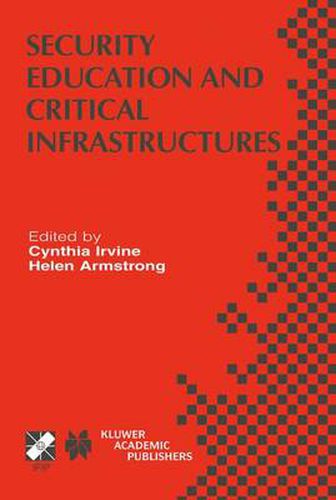Readings Newsletter
Become a Readings Member to make your shopping experience even easier.
Sign in or sign up for free!
You’re not far away from qualifying for FREE standard shipping within Australia
You’ve qualified for FREE standard shipping within Australia
The cart is loading…






This title is printed to order. This book may have been self-published. If so, we cannot guarantee the quality of the content. In the main most books will have gone through the editing process however some may not. We therefore suggest that you be aware of this before ordering this book. If in doubt check either the author or publisher’s details as we are unable to accept any returns unless they are faulty. Please contact us if you have any questions.
In ways both obvious and obscure, information technology is transforming our daily lives, yet the penetration of information technology into our critical infrastructures is still in its early stages. Security is an enabling technology. If these systems are built to be trusted, so that our privacy is maintained, so that transaction integrity can be relied upon, and so that resources are there when needed, then new paradigms for work and play will emerge. The challenge for educators is to create ways to ensure that those who must construct our enabling technology are equipped with the foundations and knowledge required doing the job. This book presents developments in research and practice on teaching information security, and covers topics including: curriculum design; laboratory systems and exercises; security education programme assessment; distance learning and web-based teaching of security; teaching computer forensics; laboratory-based system defence games; security education tools; and education in security policies, management and system certification. The book includes case studies throughout. The volume contains the papers selected for presentation at the third World Conference on Information Security Education (WISE3). The conference and workshops were sponsored by the International Federation for Information Processing (IFIP), organized by IFIP Working Group 11.8, and held in Monterey, California, USA in June 2003.
$9.00 standard shipping within Australia
FREE standard shipping within Australia for orders over $100.00
Express & International shipping calculated at checkout
This title is printed to order. This book may have been self-published. If so, we cannot guarantee the quality of the content. In the main most books will have gone through the editing process however some may not. We therefore suggest that you be aware of this before ordering this book. If in doubt check either the author or publisher’s details as we are unable to accept any returns unless they are faulty. Please contact us if you have any questions.
In ways both obvious and obscure, information technology is transforming our daily lives, yet the penetration of information technology into our critical infrastructures is still in its early stages. Security is an enabling technology. If these systems are built to be trusted, so that our privacy is maintained, so that transaction integrity can be relied upon, and so that resources are there when needed, then new paradigms for work and play will emerge. The challenge for educators is to create ways to ensure that those who must construct our enabling technology are equipped with the foundations and knowledge required doing the job. This book presents developments in research and practice on teaching information security, and covers topics including: curriculum design; laboratory systems and exercises; security education programme assessment; distance learning and web-based teaching of security; teaching computer forensics; laboratory-based system defence games; security education tools; and education in security policies, management and system certification. The book includes case studies throughout. The volume contains the papers selected for presentation at the third World Conference on Information Security Education (WISE3). The conference and workshops were sponsored by the International Federation for Information Processing (IFIP), organized by IFIP Working Group 11.8, and held in Monterey, California, USA in June 2003.